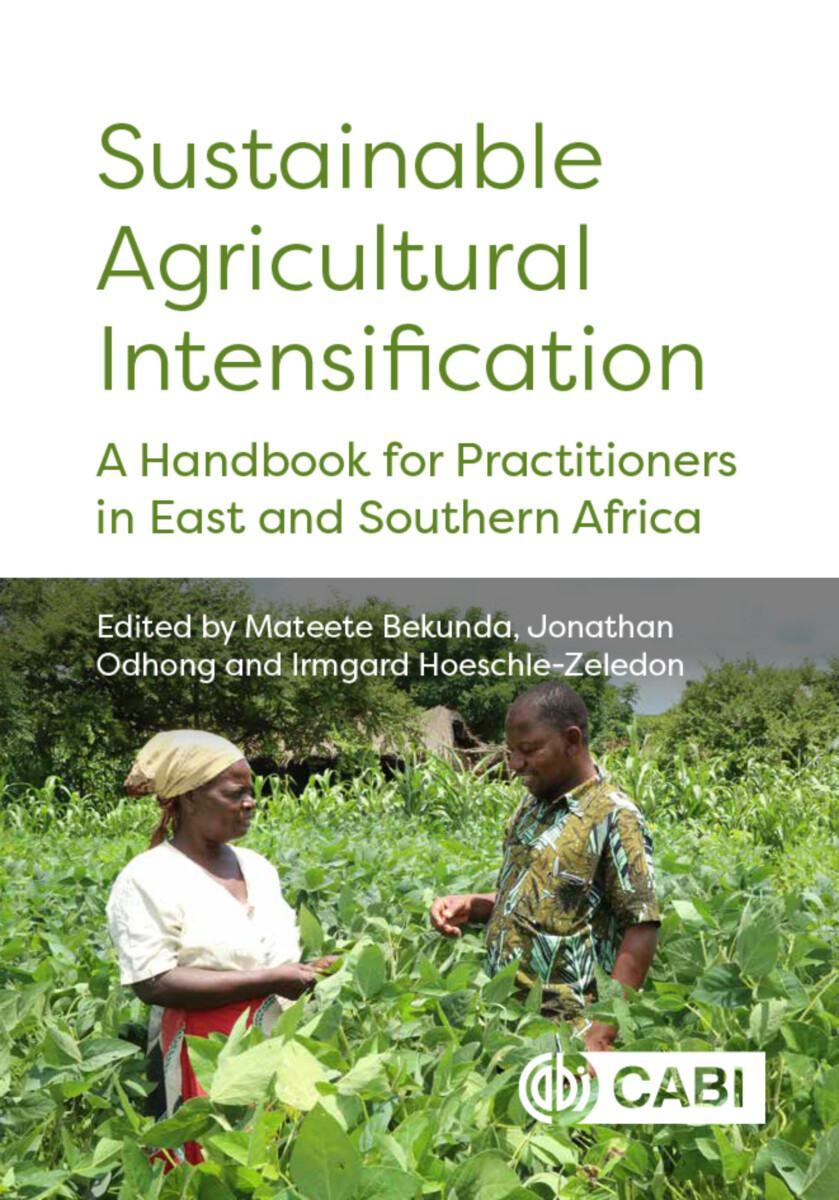Sustainable Agricultural Intensification
A Handbook for Practitioners in East and Southern Africa
- Publisher
CABI - Published
14th April 2022 - ISBN 9781800621602
- Language English
- Pages 208 pp.
- Size 6" x 9"
This book provides an insight into the background, lessons learned, and the methodology of facilitating the application of best-bet/best-fit agricultural technologies to smallholder farms in East and Southern Africa (ESA). All technologies highlighted within this book, except those on livestock feeding, were trialed and demonstrated in farmers' fields over an eight-year period [2012 - 2020] as part of the Feed the Future/USAID funded research-for-development Africa RISING ESA Project and supported by the CGIAR. The livestock feed technologies were compiled from Eastern Africa literature and included to offer a full set of technologies relevant for farmers in mixed farming systems.
Topics covered include the introduction of resilient and nutrient-dense crops, better arrangement of crops in the field to amplify intercrop benefits, and the management of soils to improve soil fertility and minimize physical soil and nutrient loss. The publication also features technologies for postharvest loss reduction, livestock feeding, food processing, and in the later chapters, important expositions on how multiple technologies can be creatively integrated in a farming system and how key products of research can be taken to scale. In the first chapter and throughout the handbook, the importance of taking gender dynamics into account to ensure technologies produce equitable outcomes is emphasized.
This book:
- provides evidence-based descriptions of sustainable agricultural intensification technologies that have been validated iteratively with smallholder farmers
- is a convenient, easy-to-read, and science-based 'how-to' guide for successful deployment of improved agricultural technologies that will ensure readers from development/scaling agencies save time and resources for research trials and instead focus on technology deployment
- gives evidence of how building research and development partnerships can be a critical element for successful delivery and scaling up of agricultural technologies.
The book is aimed primarily at development practitioners who seek new competences in taking new technologies to scale. However, the breadth of topics covered makes this book an essential resource for agricultural scientists as well as university and college students aspiring to apply systems thinking in future agricultural research and development work.
1: Weaving gender into sustainable intensification interventions
2: New high-yielding, stress-resilient, and nutritious crop varieties
3: Cereal–legume cropping systems for enhanced productivity, food security, and resilience
4: Management of soil fertility through application of fertilizers
5: Soil and water conservation for climate-resilient agriculture
6: Land management through conservation agriculture and associated practices
7: Improved technologies for reducing post-harvest losses
8: Improved feeding for dairy cattle and poultry in smallholder crop–livestock systems
9: Improved household nutrition through home-grown produce and consumption of nutritious and healthy products
10: Combining multiple technologies: Integrated soil fertility management
11: Taking technologies to a greater scale
Mateete Bekunda, PhD
Mateete Bekunda holds a PhD in Soil Fertility from the Australian National University. He joined IITA in 2012 as a Chief Scientist to provide scientific leadership to the Africa RISING Program’s East and Southern Africa Project which is implemented by a multi-institutional research and development team that develops, recommends and delivers for scaling integrated natural resource, crop and livestock management technologies and tools to address farmers’ needs in different intensification gradients in the target regions of Tanzania, Malawi and Zambia.
Jonathan Odhong
Jonathan Odhong is a science communication professional with over 10 years experience in research and development communication across 15 countries. He holds a Master of Arts in Communication Studies from The University of Nairobi in addition to other professional certifications. Jonathan joined IITA in 2014 as a Research Communication Specialist for the two IITA-led Africa RISING regional projects in East and Southern Africa and in West Africa. He is currently the Communications and Knowledge Sharing Coordinator for the Africa RISING Program. Jonathan oversees the preparation and implementation of the communication and knowledge management strategy for the Africa RISING program in all the six sub-Saharan Africa countries where activities are being implemented.
Irmgard Hoeschle-Zeledon, PhD
Irmgard Hoeschle-Zeledon studied General Agricultural Sciences at the University of Hohenheim, Germany, from where she obtained in 1984 her PhD from the Faculty of Plant Production and Landscape Ecology. She joined IITA in 2008 as the Coordinator of the CGIAR Systemwide Program on Integrated Pest Management (SP-IPM), a position held until end of 2013 when the program officially came to an end. Since 2011, she is the Manager of the Africa RISING Program’s East and Southern Africa and West Africa Projects which are inplemented in multiple countries by a consortium of national and international research and development organizations.


